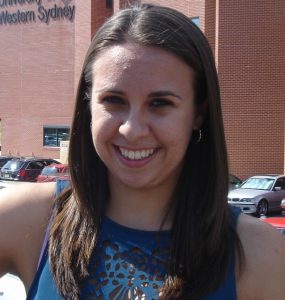Please tell us about your career pathway to date (positions and institutes).
I completed my Bachelor of Health Science (PDHPE) at Western Sydney University from 2009-2011, with the intention of completing a Master of Teaching and becoming a PE teacher. In 2012, I completed my honours year and fell in love with research, so decided to undertake a PhD on physical activity and mental health with Prof Chris Lonsdale, completed across Western Sydney University and Australian Catholic University. I graduated in 2017 and commenced my current Lecturer position at Western Sydney Uni in 2018, teaching into the very degree I completed as a student.
How would you briefly describe your current research/job to someone who is not familiar with your field of study/work? What is your main research interest?
My research sits mostly within the exercise psychology field and I’d say my main research aim is to better understand how to promote mental health through physical activity. A large portion of my research sits within this area by examining how contextual factors (e.g., time of day, interaction with others, motivation) influence the relationship between physical activity and mental health, so that these factors can be targeted in future interventions and physical activity guidelines. The rest of my research focuses on physical education in terms of psychological aspects such as motivation, wellbeing, and embarrassment, with much of this work being guided by self-determination theory. But, of course being a lecturer, my work also involves teaching. I get to teach sport and exercise psychology to our PE and sport and exercise science students, as well as the gymnastics unit for our PE students which is all about using variety and modified activities to develop teamwork, problem solving, and resilience in PE lessons.
What are the main barriers you encounter/experience when conducting research, or what information/skills do you lack to conduct high quality research?
During my first year as an ECR, the biggest challenge was trying to develop new collaborations. While having a variety of research areas within your own institution has its benefits, it became clear quite quickly that I needed to build networks with those who worked in the same areas as me to plan together and bounce ideas off each other. Working together and challenging each other’s thoughts and plans definitely brings out better research but as an ECR it takes time to build these networks.
What could help you as a student/ECR to further develop/grow in your current position?
Definitely more opportunities to build networks and share ideas informally with other academics outside your institution. Maybe mini conferences or short research events just within a specific state or country. This would enable us to informally connect and share ideas and research plans with experts in our field at neighbouring institutions.
What do you think will be the next most important development in the nutrition and/or physical activity field?
In terms of physical activity and mental health, I think (and hope) more specific guidance is on its way around how to exercise specifically for mental health benefits. We know now that the guidance is different for mental health benefits, compared to physical health benefits. And we also know that physical activity can have completely opposite effects on mental health depending on the context. Updating physical activity guidelines and developing more contextually tailored interventions and programs could provide more optimal real-world benefits for those who want to engage in exercise to improve their mental health.
Get in touch with Rhiannon via email Rhiannon.White@westernsydney.edu.au or follow her on twitter @RhiannonLWhite


